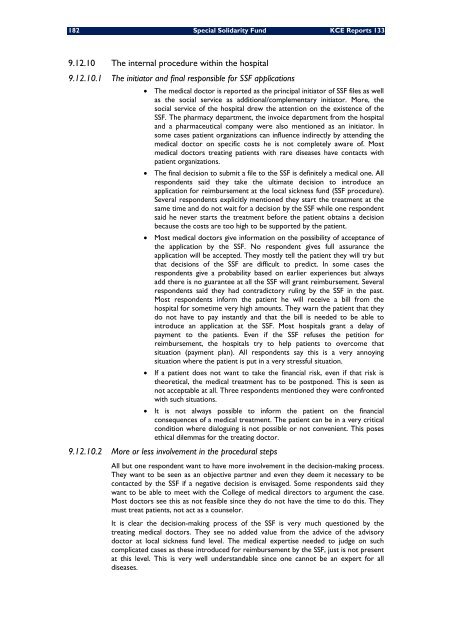Optimalisatie van de werkingsprocessen van het Bijzonder ... - KCE
Optimalisatie van de werkingsprocessen van het Bijzonder ... - KCE
Optimalisatie van de werkingsprocessen van het Bijzonder ... - KCE
You also want an ePaper? Increase the reach of your titles
YUMPU automatically turns print PDFs into web optimized ePapers that Google loves.
182 Special Solidarity Fund <strong>KCE</strong> Reports 133<br />
9.12.10 The internal procedure within the hospital<br />
9.12.10.1 The initiator and final responsible for SSF applications<br />
• The medical doctor is reported as the principal initiator of SSF files as well<br />
as the social service as additional/complementary initiator. More, the<br />
social service of the hospital drew the attention on the existence of the<br />
SSF. The pharmacy <strong>de</strong>partment, the invoice <strong>de</strong>partment from the hospital<br />
and a pharmaceutical company were also mentioned as an initiator. In<br />
some cases patient organizations can influence indirectly by attending the<br />
medical doctor on specific costs he is not completely aware of. Most<br />
medical doctors treating patients with rare diseases have contacts with<br />
patient organizations.<br />
• The final <strong>de</strong>cision to submit a file to the SSF is <strong>de</strong>finitely a medical one. All<br />
respon<strong>de</strong>nts said they take the ultimate <strong>de</strong>cision to introduce an<br />
application for reimbursement at the local sickness fund (SSF procedure).<br />
Several respon<strong>de</strong>nts explicitly mentioned they start the treatment at the<br />
same time and do not wait for a <strong>de</strong>cision by the SSF while one respon<strong>de</strong>nt<br />
said he never starts the treatment before the patient obtains a <strong>de</strong>cision<br />
because the costs are too high to be supported by the patient.<br />
• Most medical doctors give information on the possibility of acceptance of<br />
the application by the SSF. No respon<strong>de</strong>nt gives full assurance the<br />
application will be accepted. They mostly tell the patient they will try but<br />
that <strong>de</strong>cisions of the SSF are difficult to predict. In some cases the<br />
respon<strong>de</strong>nts give a probability based on earlier experiences but always<br />
add there is no guarantee at all the SSF will grant reimbursement. Several<br />
respon<strong>de</strong>nts said they had contradictory ruling by the SSF in the past.<br />
Most respon<strong>de</strong>nts inform the patient he will receive a bill from the<br />
hospital for sometime very high amounts. They warn the patient that they<br />
do not have to pay instantly and that the bill is nee<strong>de</strong>d to be able to<br />
introduce an application at the SSF. Most hospitals grant a <strong>de</strong>lay of<br />
payment to the patients. Even if the SSF refuses the petition for<br />
reimbursement, the hospitals try to help patients to overcome that<br />
situation (payment plan). All respon<strong>de</strong>nts say this is a very annoying<br />
situation where the patient is put in a very stressful situation.<br />
• If a patient does not want to take the financial risk, even if that risk is<br />
theoretical, the medical treatment has to be postponed. This is seen as<br />
not acceptable at all. Three respon<strong>de</strong>nts mentioned they were confronted<br />
with such situations.<br />
• It is not always possible to inform the patient on the financial<br />
consequences of a medical treatment. The patient can be in a very critical<br />
condition where dialoguing is not possible or not convenient. This poses<br />
ethical dilemmas for the treating doctor.<br />
9.12.10.2 More or less involvement in the procedural steps<br />
All but one respon<strong>de</strong>nt want to have more involvement in the <strong>de</strong>cision-making process.<br />
They want to be seen as an objective partner and even they <strong>de</strong>em it necessary to be<br />
contacted by the SSF if a negative <strong>de</strong>cision is envisaged. Some respon<strong>de</strong>nts said they<br />
want to be able to meet with the College of medical directors to argument the case.<br />
Most doctors see this as not feasible since they do not have the time to do this. They<br />
must treat patients, not act as a counselor.<br />
It is clear the <strong>de</strong>cision-making process of the SSF is very much questioned by the<br />
treating medical doctors. They see no ad<strong>de</strong>d value from the advice of the advisory<br />
doctor at local sickness fund level. The medical expertise nee<strong>de</strong>d to judge on such<br />
complicated cases as these introduced for reimbursement by the SSF, just is not present<br />
at this level. This is very well un<strong>de</strong>rstandable since one cannot be an expert for all<br />
diseases.

















